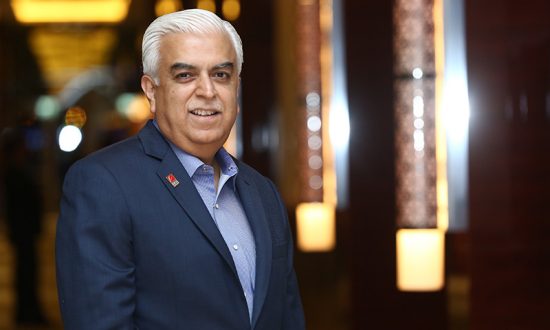Coming from a humble, middle-class, extremely value-based background, Niranjan Gidwani is the Consultant Director, Member UAE Superbrands Council and Former CEO of Eros Group Dubai. Mr. Gidwani is known for his vision and his ability and expertise to build regional groups and organisations into brands. He is a degree holder in Mechanical Engineering and an MBA from the Symbiosis Institute of Management, Pune, India. He has also attended several top management courses at institutions such as the Indian Institute of Management Ahmedabad, the Seven Habits program under Dr Steven Covey and several others across the world. Mr. Gidwani has over 38 years of hard-core senior management experience with a strong exposure to handling international business.
Seeing something up-close gives each of us a view and an understanding that no amount of information or briefings can ever give.
The last few years have been a period of rapid changes. The circumstances of the last two years have accelerated those changes and have altered human behavior and decision making like never before.
As the digital revolution exploded, we have been forced to work from home/stay at home, and many of us have embraced it as our future or preferred way of working or living.
Big data and analytics are the often repeated buzz words. Due to speed of technology, software and devices, dashboards are getting refreshed and updated every second. Artificial Intelligence and machine learning is being programmed to even take decisions and action based on the data. Cyber wars and even real ones are activated from remote locations.
Distances seem to have lost all significance, and many of us have great comfort with just having detailed knowledge at our fingertips. Just the fact that many of us have reams of information is getting us on a high. What to do with the information is becoming less relevant.
There is a whole universe to explore there, whilst being just wherever we want to be.
And yet, for the best of intelligence agencies of the world, one of the most valuable assets is their on-ground human intelligence. It helps decision making and increases the chances of operational success of their campaigns. The same holds true for governments and for organizations.
The truth is that, while technology aids and helps us create scale and access many data points with high frequency, finally, behind all outcomes is the human interface that determines the direction. The choices that are made influence the results. So, even the most independent and neutral data is not without its biases. Sometimes it can tell us the ‘what’ and ‘how’ but the ‘why’ is still something that needs to be inferred, and then acted upon. By someone.
And even if a machine has been programmed to make decisions, that someone is required to create the program and machine learning.
People close to the action or situation on ground have a deeper understanding of the situation, and in critical issues, can validate or invalidate an accepted view, based on which decisions can be taken or stopped. All our decisions involve people, their beliefs and their behavior under varying circumstances and socio-cultural differences. The sentiments and emotions, within a country, or an organization, or a family, whether expressed or repressed are never entirely captured in numbers. We all know that those are key determinants in choices that humans need to make.
With margins under pressure, the requirement to scale up with speed is today’s gold rush. Large businesses, large governments, coupled with digital enablement and technology generate vast amounts of data. It is true many answers lie there, but only many or some, not all. Many have found great comfort in the last few years on decisions taken based on information that is served to them. Increasingly many are enjoying what they believe is the ability to manage businesses and governments remotely. This belief over time will cause immense damage as decision makers distance themselves from not just the reality of business but also their employees and stakeholders.
Negotiating the space between remote and up-close will be at the heart of empathetic management. We cannot afford to miss the Big Picture. But it is equally important to get close, and to know the strokes of the brush that make the picture.
In other words, living in the world of “Wearing bi-focals”. Both the near, and the distant need to be clear and visible. And decisions get implemented only through people. Spending lots of time being close to those on the ground, or closer to the ground, helps.
The world of Metaverse will happen. And many will end up making money betting on the metaverse. But for now, lets deal empathetically with real people who matter.






